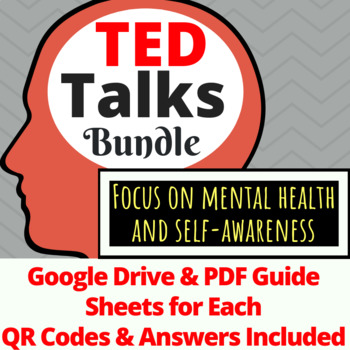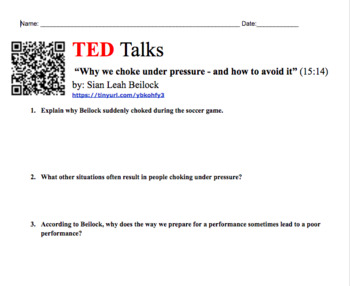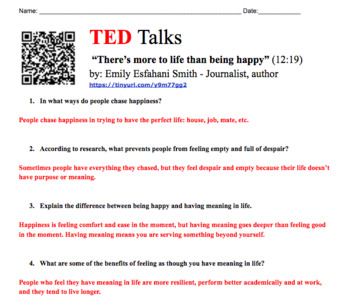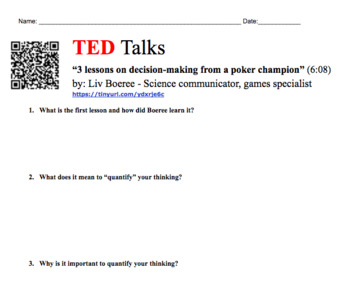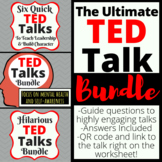Ted Talk Guides: Focus on Mental Health
- Zip
- Google Apps™

What educators are saying
Also included in
- I've put together a bundle of 24 of my most popular Ted Talk guide sheets!This bundle includes:Teacher notes about each talkGuide questions for each talk. Questions include basic recall as well as an extension of the newly acquired information. Link and QR code to the talk right on each worksheetAnsPrice $13.20Original Price $16.50Save $3.30
Description
These highly engaging Ted Talks focus on mental health and self-awareness - two areas our students definitely need help with!
Included in this download are guides for each talk. Guides are available as a PDF or as a Google Doc - whichever works best for your students and your printing situation. I also included a link and a QR code for the talk directly on the worksheet so students can access the talks outside of the classroom. This works great for students who are absent from class the day of the talk or if you want to have students access the talks on their own rather than as a class.
Guide sheets for the following talks are included in this bundle:
1. Why we choke under pressure - and how to avoid it
I wish I had seen this talk when I was younger! Beilock, the Ted presenter, goes through the different aspects of why we choke - ineffective study habits, for example - and how to prevent it in the future. Using the perfect mixture of science and personal anecdotes, Beilock clearly explains strategies students can use immediately. Bonus - most of the performance examples given are relevant to students: exams, sports games, presentations, and job interviews.
2. There's more to life than being happy
Presenter, Emily Esfahani Smith, details the four pillars needed for happiness. Spoiler alert, it's not the perfect car, job, house, or mate. Again, Smith lays everything out in a way that students can relate to and understand. Students are immediately able to start planning out how they can achieve the four pillars as well.
3. Forget multitasking, try monotasking
Our students are the kings and queens of multitasking, but are they really getting anything done? This talk gets students discussing what it means to multitask, why we're always trying to do three things at once, and why it might be time to stop. This super-quick talk is under three minutes in length, but it's never been more relevant. This guide sheet includes a graphic organizer to help students track how much they multitask. They're always surprised to hear eating breakfast and browsing online while listening to music is multitasking. The sheet ends with a class discussion on how we can tone down multitasking and live in the moment.
4. All it takes is 10 mindful minutes
Similar to the previous talk, this one focuses on slowing life down and being present in the moment. However, this talk details how we can do it and why it is so important to our mental health. Our minds, those same minds that control so much of what we do and think and feel, never get a break. We never just let it relax; we're always worried about the future or the past. We're planning this and dreading that. Using some awesome comparisons, juggling and a toothache, presenter Puddicombe shows students what we miss when we're not living in the present. He also explains how we make a few changes to get our lives back. This talk is essential for our stressed out and anxious students.
5. 3 lessons on decision-making from a poker champion
Okay, so this quick six-minute talk isn't as heavy as the previous talks, but it still has some great information and the students always enjoy it. Liv Boeree makes some humorous connections between poker decisions and our everyday life decisions. The main takeaways: luck has more to do with our success than we give it credit for, we use way too many ambiguous words when making decisions (probably, likely, etc.) and we should only trust our gut on situations we are familiar with.
This lesson is fun to do with the students because it's interesting to see how self-aware they are. We do discussions on their own successes and how much was luck versus skill. This is also a good opportunity to lead into a discussion on empathy. If our success relies on luck, our failure likely does somewhat as well; therefore, we shouldn't be so quick to judge someone else who is in a difficult situation or has made a bad decision.
Love Ted Talks? Check out my other Ted Talk products:

